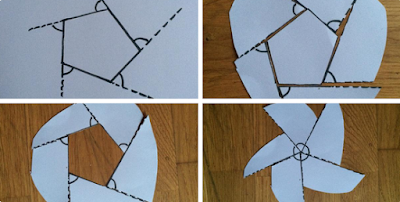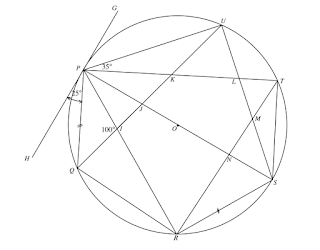 Hello and welcome to my 32nd gems post. This is where I share teaching ideas and resources I've seen on Twitter.
Hello and welcome to my 32nd gems post. This is where I share teaching ideas and resources I've seen on Twitter.1. Expression of the Day
You might already be familiar with Jeremy Denton's (@Jeremy_Denton) lovely starter activity Number of the Day. He's now created Expression of the Day too. These activities can be used to ensure that students frequently practise their number and algebra skills. Do check out Jeremy's blog post Starter Activity - Expression of the Day for the PowerPoint file and an example of how to use this fantastic resource.
In the last lesson or two of the school year some teachers show videos during maths lessons, which I think is fine as long as students are learning about maths from those videos. Not sure what to show? Thanks to @AlgebraFact for sharing this page of Mathematics Documentaries from CosmoLearning - plenty to choose from here.
For more ideas for end of term lessons, see my post 'End of term!'.
3. Angles in a Polygon
Thanks to @sporteredu for sharing these pictures showing a practical demonstration of the exterior angles of a polygon summing to 360o.
Thanks to @sporteredu for sharing these pictures showing a practical demonstration of the exterior angles of a polygon summing to 360o.
@ProfSmudge shared a similar set of pictures of an irregular pentagon.
I've always used an animation to demonstrate this and have never thought of doing this lovely paper-based alternative.
For more animations see my post Animations and Simulations.
For more animations see my post Animations and Simulations.
4. Reasoning Statements
Thanks to Mel (@Just_Maths) for sharing this awesome circle theorems activity 'Great angle chase'. I love activities like this - it's my favourite kind of maths problem.
I particularly liked these reasoning statements - a great list of propositions for class discussion. The teacher presents a proposition and asks questions such as "Is it true?", "Is it just sometimes true, or is it or always true?", "When is it true? How do you know?", "How could we demonstrate/show/prove that it is true?". Examples include:
I was very pleased that Mel shared this link because it led me to a resources website I'd never seen before. I've now added lots of resources from Top Drawer Teachers to my resources libraries.
I particularly liked these reasoning statements - a great list of propositions for class discussion. The teacher presents a proposition and asks questions such as "Is it true?", "Is it just sometimes true, or is it or always true?", "When is it true? How do you know?", "How could we demonstrate/show/prove that it is true?". Examples include:
- The mean of three consecutive numbers is the middle number.
- Triangles tessellate.
- Volume = area of the end × length
- If the water in our dams increases by 10% this month, and then decreases by 10% next month, it will be back to where it started.
5. Zoolander
Mary Pardoe (@PardoeMary) shared a lovely blog post by Simon Gregg (@Simon_Gregg) about teaching Year 4 about scaling. It features a Zoolander question from Robert Kaplinsky (@robertkaplinksy). Fans of Zoolander will like this!
Students need to think about how many times would you need to scale a model up to make a real school. Questions to ask and possible approaches are detailed on robertkaplinksy.com.
 This week I discovered that changing schools is a bit like looking after a newborn baby - I knew it was going to be really hard but it turned out to be even harder than I'd imagined. I'd read Mel's post about changing school which helped me mentally prepare for the challenge, but it's still been a huge culture shock. My previous school was a girls' grammar school and my new school is a boys' comprehensive. It's going to be a steep learning curve. I'm lucky to have started with a light timetable to give me a chance to find my feet, plus the maths department is very supportive and friendly, so I'll survive!
This week I discovered that changing schools is a bit like looking after a newborn baby - I knew it was going to be really hard but it turned out to be even harder than I'd imagined. I'd read Mel's post about changing school which helped me mentally prepare for the challenge, but it's still been a huge culture shock. My previous school was a girls' grammar school and my new school is a boys' comprehensive. It's going to be a steep learning curve. I'm lucky to have started with a light timetable to give me a chance to find my feet, plus the maths department is very supportive and friendly, so I'll survive!This has been such a busy week, what with starting my new job and celebrating my youngest daughter's 1st birthday. On top of that there was the very funny #EdexcelMaths Twitterstorm that made maths a national talking point.
In other news:
- Colin Hegarty, who I did PGCE with at Kings, showed me his amazing new website. It's yet to be launched but I can assure you it is going to be awesome - maths teachers will find it incredibly useful. I can imagine every school in the country eventually using it for homework and assessment. Do remember to vote for it here if you haven't already.
- I'm enjoying the Summer Math Photo Challenge 2015. It's easy to join in - just check the weekly challenge (listed below), take a photo and tweet it with the hashtag #mathphoto15.
- I love the updates to solvemymaths.com, including the fantastic work Ed has done organising the #mathsTLP collection. If you've not yet participated in #mathsTLP then do join us at 7pm on Sundays to share lesson ideas and resources (more details here).
- Did you see my page 'New GCSE Support' which links to resources for the new GCSE topics? I'll be adding a lot more resources over the next couple of months. You can access this page from the 'Extras' menu on my blog (top right - unless you're viewing the mobile site in which case you'll need to click on 'view web version' to see this menu).
- The London Maths Hubs are joining forces to run a conference on Thursday 9th July. It looks like a good selection of speakers and workshops so if you're based in or near London it would be worth asking for a day out of school so you can attend.
- There's some lovely new resources coming from my favourite websites lately - do check out the recent offerings from MathsPad, Teachit Maths and Median Don Steward.
- This article about the relative difficulty of maths exams around the world is interesting. I like these box plots:
- Finally, Billy Adamson asked people to describe maths in one word and here's the fantastic results:











Hello. I have interviews coming up for maths PGCE courses (including one at Kings :)) and your obvious passion makes me excited to start my teacher career. It's refreshing to see such enthusiasm among all the negative articles I keep reading about teaching at moment. Keep up the amazing work!
ReplyDeleteThe GCSE students' reaction to the sweets question was hilarious. I am curious, from a teacher's perspective, what do you think it was about the question that they seemed to struggle so much with?
Anyhoo, I'm looking forward to putting your great resources into practice (and hopefully create many of my own)! Emma
Hi Emma. That's fantastic, good luck with your interviews. The students' reactions did make me chuckle. Their reaction was partly because they see the two topics (probability and quadratics) as separate entities, partly because they're used to more structured questions, and partly because they always hate 'show that' quadratic questions, whatever the context. It's not the first time students have found an exam hard, but the first time Twitter has been used so extensively to share reactions. I quite liked the question, it was a good top-end differentiator. Anyway, I hope all goes well with your PGCE - make sure you're on Twitter for the best support available. :)
Delete